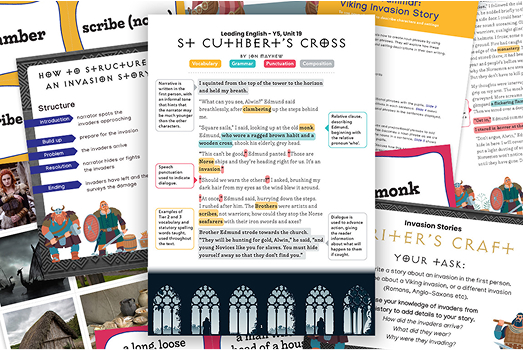Should we use a scheme or build our own writing curriculum?
It’s a familiar dilemma: schemes bring clarity and convenience but risk feeling prescribed. Building a curriculum from scratch offers autonomy and precision, but can leave teachers overwhelmed by sequencing progression and grasping prior or future learning.
What about pedagogy? Which whole-school approach works best? And how should assessment fit in?
That’s where structured frameworks really help.
Why structure matters – not scripts
Frameworks don’t dictate every lesson. Instead, they provide:
Clear developmental pathways for writing skills
Flexibility to adapt content and texts to your context
A shared language that builds confidence and coherence across staff
They empower teachers and boost impact.
Why now?
According to the DfE’s new Writing Framework, writing remains one of the least consistently taught components of English. Nationally, KS2 writing outcomes still lag behind reading and maths.
Teachers work hard but often without the tools to make their efforts sustainable.
Structured frameworks complement, not replace, teacher expertise
They bring clarity about what to teach, when, how and why. Curriculum leads gain confidence to quality-assure provision. Frameworks help schools:
Secure progression
Embed grammar and language meaningfully
Align writing instruction with wider curriculum goals
And crucially, frameworks respect teacher professionalism and time.
Wherever you sit on the scheme-to-own writing curriculum spectrum, structured frameworks sharpen vision and support staff effectively.
Eight strategies to strengthen your writing provision
Audit progression, not just presence
Don’t just check off objectives – look for real skill development over time. Spot repetition, gaps or regression to reshape your curriculum for deeper progression.
Make purpose central – why pupils write matters
Focus on why pupils are writing – to persuade, inform, entertain – not just the genre. Purpose sharpens grammar, vocabulary and structure choices.
Map thinking before writing to build ideas
Help pupils plan and organise ideas before writing. Use talk, shared planning or story maps to reduce anxiety and improve quality.
Teach grammar in context – not isolation
Embed grammar lessons into real writing tasks so pupils see it as a tool for impact, not just rules to learn.
Use flexible models, not rigid templates
Offer rich, authentic texts as examples that show variety and adaptability – not fixed formats to copy.
Build a shared language for feedback
Use consistent terms like ‘cohesion’ and ‘precision’ across school to help pupils understand and apply feedback better.
Sequence for mastery over coverage
Prioritise depth over breadth. Focus on key skills such as sentence control or paragraph cohesion and revisit them to build lasting mastery, not just tick boxes.
Separate writing from publishing – drafting matters
Give pupils space to draft and experiment without pressure to produce perfect final pieces every time.
Need help developing your structured writing framework?
At Leading English, we support schools and trusts to move beyond schemes – and beyond burnout. Our values-led consultants work with you to:
Map a coherent, progressive writing curriculum
Embed evidence-informed pedagogies
Develop simple, sustainable assessment systems
Tailored support, no off-the-shelf solutions.





